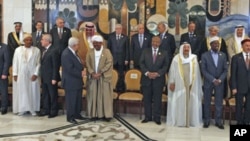Violence across Syria killed at least 36 people - nearly half of them soldiers - as Arab leaders in Baghdad backed a peace plan during a summit focused on resolving the year-long anti-government revolt.
Syrian state media said Thursday that insurgents kidnapped an Air Force general near Damascus while gunmen shot and killed two army colonels in the northern city of Aleppo. The state news agency SANA blamed the actions on "armed terrorist groups," a reference to army defectors and rebels of the opposition Free Syrian Army.
Kofi Annan's Six-Point Peace Plan
- A Syrian-led political process to address the aspirations and concerns of the Syrian people.
- A U.N. supervised end to armed violence by all parties in Syria.
- Timely humanitarian assistance in all areas affected by fighting.
- Increasing the pace and scale of release of arbitrarily detained people.
- Ensuring freedom of movement for journalists.
- Respecting freedom of association and the right to demonstrate peacefully.
Rights activists said forces loyal to President Bashar al-Assad assaulted opposition hubs in central Syria and the northern province of Idlib Thursday. They said rebels killed two soldiers in an ambush in Hama province.
Meanwhile, Arab leaders at a Baghdad summit endorsed the Syria peace plan drafted by international envoy Kofi Annan and called for its immediate and complete implementation.
The plan urges both sides to start a cease-fire and a dialogue but does not call for Mr. Assad to step down as part of a political transition.
Arab leaders previously had urged the Syrian president to hand power to a deputy to manage the transition, but now they appear to have backed away from that demand.
Mr. Assad said he will "spare no effort" to ensure the success of the Annan plan, but that it would depend on an armed groups stopping their "terrorist actions." He also said countries providing money and weapons to the Syrian opposition must stop immediately to enable Mr. Annan's mission to succeed.
In an apparent reference to Turkey, a former ally that now hosts the rebel FSA, he singled out "neighboring countries that harbor these groups and facilitate their terrorist actions."
In Washington, State Department spokesman Mark Toner called Mr. Assad's remarks "discouraging." He again urged the Syrian president to halt the violence immediately, saying government forces have done nothing to comply with the Annan peace plan in the three days since agreeing to it.
U.N. Secretary-General Ban Ki-moon said it is "essential" for the Syrian president to put his commitments into immediate effect. Speaking to Arab leaders at the start of the Baghdad summit, Mr. Ban accused the Syrian government of failing to fulfill its responsibility to protect its own people.
Only nine leaders of the Arab League's 22 members traveled to Iraq for the summit. Mr. Assad was not invited. The absence of other leaders reflected ongoing divisions within the Arab League about how to end Syria's violence.
Meanwhile, Britain announced that it will provide $800,000 in non-lethal support to anti-Assad activists inside Syria to help them document government rights violations and develop skills to build a democratic society.
The United Nations says violence linked to Syria's crackdown on the revolt has killed more than 9,000 people.
Watch related video of Syrian violence
Some information for this report was provided by AP, AFP and Reuters.
| Join the conversation on our social journalism site - Middle East Voices. Follow our Middle East reports on Twitter and discuss them on our Facebook page. |




